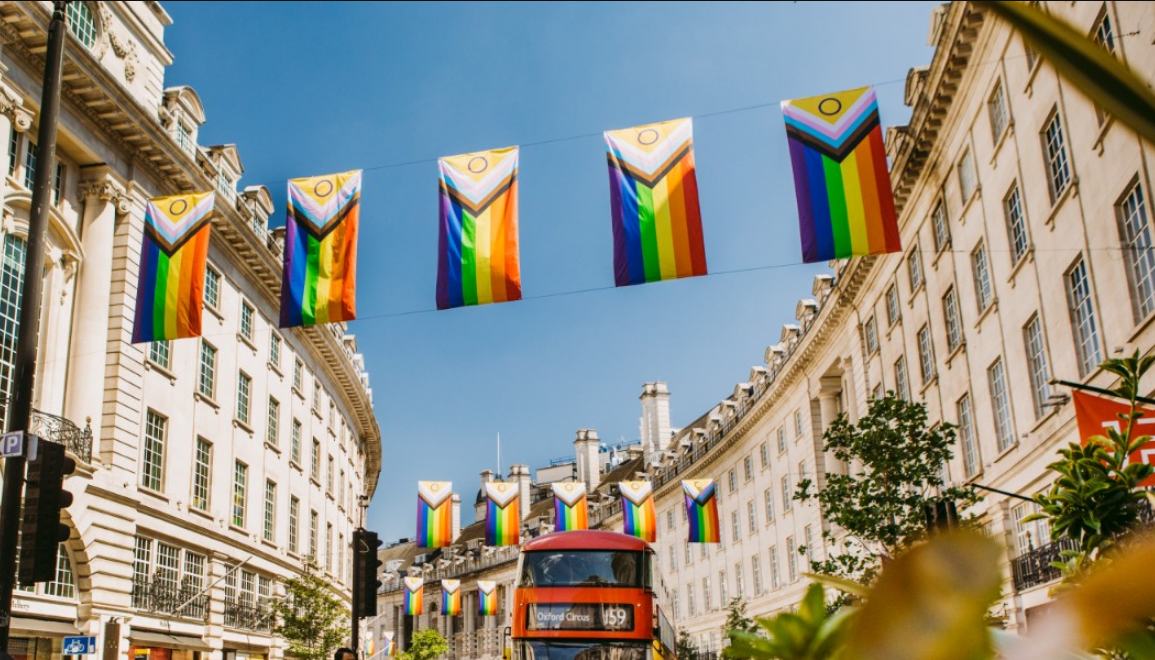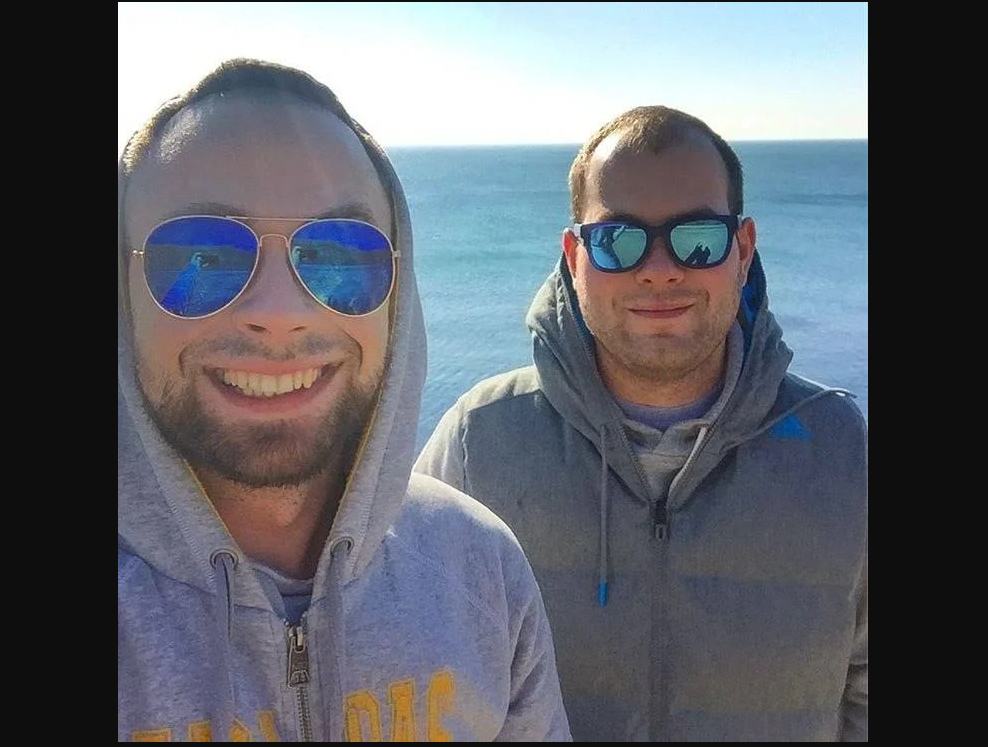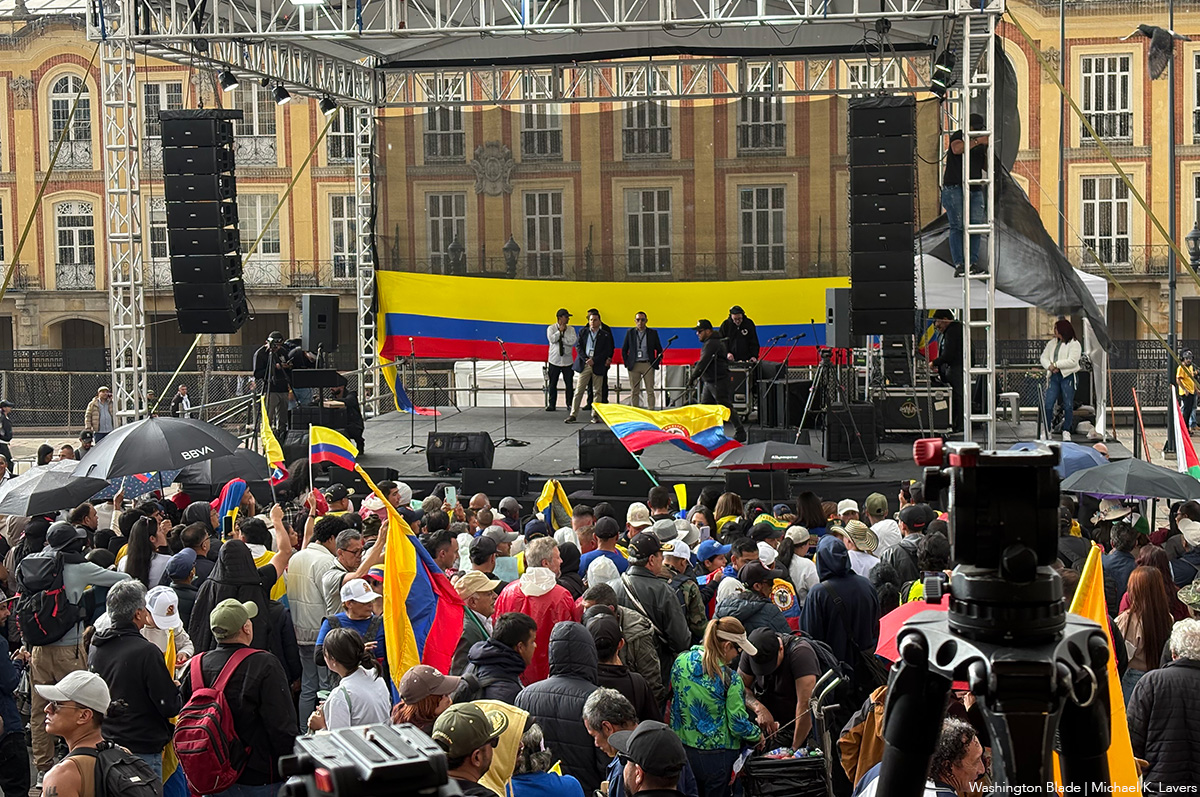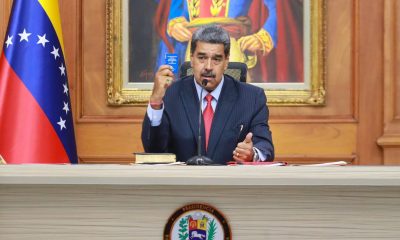World
Out in the World: LGBTQ news from Europe and Asia
Lufthansa is commemorating Pride Month

FRANCE

Transgender actress Karla Sofía Gascón has filed a legal complaint against French far-right politician Marion Maréchal-Le Pen, after the Reconquête Party leader posted a tweet decrying the fact that Gascón was awarded Best Actress at the Cannes Film Festival. The complaint has been joined with complaints from six French LGBTQ advocacy groups.
Gascón has been making waves since her international breakthrough performance in the musical gangster film “Emilia Pérez” at the Cannes Film Festival last month. In the film, she plays a cartel leader who hires a lawyer played by Zoe Saldaña to help her flee Mexico with her wife, played by Selena Gomez, so that she can get gender-affirming surgery so she can live as a woman.
The Spanish actress became the first trans woman to win the Best Actress award at the Cannes Film Festival.
After her win, Maréchal-Le Pen posted a tweet that said Gascón’s victory came at a cost for women.
“Therefore, a man receives the prize for … best actress at Cannes. Progress for the left is the erasure of women and mothers,” Le Pen posted on May 26.
Gascón’s lawyer, Etienne Deshoulières, told Agence France-Presse she had filed a legal complaint for “sexist insult on the basis of gender identity.”
The organizations Mousse, Stop Homophobie, Familles LGBT, Adheos, Quazar, and Fédération LBGTQ+ have all filed similar complaints over Maréchal-Le Pen’s tweet.
Maréchal-Le Pen has responded to the complaint by asserting that she will not be silenced.
She is currently on the campaign trail leading the far-right Reconquête Party in elections to the European Parliament scheduled for June 9. She comes from a long pedigree of far-right French politicians who have all been opponents of LGBTQ rights. Her grandfather, Jean-Marie Le Pen, founded the far-right Front National party, which is now led by her aunt Marine Le Pen as the National Rally Party. She has frequently spoken of her desire to repeal same-sex marriage.
Before this all blew up, Gascón told a press conference at Cannes about her own experiences with discrimination as a trans woman.
“People who are trans are subjected to insults or death threats because they exist. In Mexico, there are harsh phrases when addressing trans people. It can be gross,” she said. “I think we should be taken for what we are. We have to continue fighting for our rights. We have our body and we’re allowed to change it.”
“We’re just normal people … I think in the world, you should be treated with respect.”
“Trans people are just normal people,” Spanish actress Karla Sofía Gascón said when asked about her non-binary character in Jacques Audiard’s ‘Emilia Perez’ #cannes2024. pic.twitter.com/BRECoys9jV
— Deadline Hollywood (@DEADLINE) May 19, 2024
In addition to Gascón’s acting award, “Emilia Pérez” scored tremendous reviews from critics at Cannes. A U.S. release date has not yet been announced.
SPAIN

The coalition of LGBTQ groups that were working together to guide the 2026 Gay Games in Valencia, Spain, has pulled out of the event in protest over what they’ve called a hijacking of the project by the city’s newly elected government, which includes a far-right anti-LGBTQ party in the governing coalition.
Spain’s third-largest city was chosen as the games’ host in November 2021, beating out Munich, Germany, and Guadalajara, Mexico. Originally Valencia’s Gay Games organization was led by a coalition of local LGBTQ groups in partnership with the city council.
But that changed last year, when the center-right People’s Party and the far-right Vox party took over the city government. The LGBTQ groups allege that the city reduced their role on the board in an attempt to take over the games, and that the new government has been hostile to LGBTQ people. They also say that the government has censored LGBTQ books, plays, and films.
On May 27, the LGBTQ+ groups — Lambda, Avegal and Dracs, and the umbrella organization València Diversitat Foundation — announced they were pulling out of the games and encouraging the Federation of Gay Games to withdraw from Valencia and award the 2026 games to another city.
“After the last local elections, the Popular Party and Vox have promoted an entire campaign of attacks and cuts in rights against members of the group,” FVD Secretary Jorge Garcia told Spain’s El Salto newspaper. “We have seen how children’s books were withdrawn or plays and films were canceled simply for addressing LGTBI themes or for showing people from the group.”
FVD is calling on the Federation of Gay Games to move the event to another city that is more LGBTQ-friendly, suggesting Munich as a possible alternate venue as it was one of the original bidders for the 2026 event. They’re also saying that unless FVD moves the event, they will “call for a boycott at the local, national, and international level.”
But so far, the federation has said it’s not budging.
In response to the pullout, the federation issued a statement saying that the games would go ahead in Valencia and that the federation has faith that the city government is hosting the games for the right reasons.
“After confidently receiving assurances from the València City Council about their commitment to the organization of the event, the FGG can confirm that the Gay Games will continue to be held in Valencia in 2026,” the statement reads. “The FGG has met various times with them to gain assurances from them about their commitment to the funding of the event, the availability of government-owned sports and culture venues, and the confirmation that participants will be able to attend and compete as their authentic selves.”
This isn’t the first time the Gay Games has experienced turmoil.
After being postponed a year due to the pandemic, last year’s Gay Games Hong Kong was divided and co-hosted with Guadalajara, Mexico, amid concerns about the worsening human rights and democracy situation in China, and deepening opposition from some local officials who were more closely aligned with Beijing.
The far-right Vox party has long been hostile to LGBTQ rights in Spain and has seen its fortunes rise along with other conservative or right-leaning parties across Europe. In Spanish cities and regions where they’ve come into power either alone or in coalition with the People’s Party, it has repealed local laws meant to protect LGBTQ people from discrimination and conversion therapy. On the national level, it has campaigned to repeal same-sex marriage and legal recognition of trans people.
GERMANY

German airlines Lufthansa is celebrating Pride Month 2024 by spoofing the company’s name with “Lovehansa” on several aircraft in its fleet. On X Deutsche Lufthansa AG wrote:
“It’s that time of the year where we highlight the importance of openness, tolerance, and equal love. We’ve been coloring the air with Lovehansa for the last two years and will continue to spread the love across borders and skies. Happy Pride Season!
It’s that time of the year where we highlight the importance of openness, tolerance, and equal love.
We’ve been coloring the air with Lovehansa for the last two years and will continue to spread the love across borders and skies.
Happy Pride Season! 🏳️🌈🫶#Lufthansa pic.twitter.com/OrJMYBjJ7P
— Lufthansa (@lufthansa) June 1, 2024
UNITED KINGDOM

A conservative Christian group has launched a petition calling for the city of Westminster in central London to remove Progress Pride flags from Regent Street, alleging that the flags are divisive, offensive, and “ugly.”
The group Christian Concern has collected more than 20,000 signatures of its 50,000 goal on its CitizenGo petition. The petition is addressed to Westminster City Council Leader Adam Hug and calls on him to “stop authorizing large scale displays of Pride Progress flags in Westminster, in particular Regent Street.”
Progress Pride flags have been strung across Regent Street — home to a world-famous luxury shopping district — for years, and they’re scheduled to return for June and July this year. Regent Street is controlled by the Crown Estates, a semi-public agency that manages the monarch’s property holdings.
In their letter, Christian Concern says the Progress Pride flags sow division in society.
“They do not promote inclusion — in fact, they exacerbate tensions between people of different characteristics — religions, sexual orientations, and gender identity. Many people experience these flags as an attack on historic, traditional beliefs about sex and gender. They send the message that people holding these views — which are worthy of respect in a democratic society — are not welcome,” the letter says.
In the petition’s explanatory note, Christian Concern alleges the Progress Pride flag is particularly offensive, because it includes colors symbolic of trans people and people of color.
“Rainbow flags are bad enough — but ‘Progress Pride’ flags add transgender stripes — a movement that has done untold damage to gender-questioning children in recent years. They also add brown and black stripes, wrongly conflating racial identity with sexual and gender identities,” it says.
“These flags are particularly offensive, and ugly to boot,” it says. “These divisive, gaudy displays are completely inappropriate for this historic, iconic street at the center of London.”
London’s annual Pride Parade will occur this year on June 29, and as usual, the route will pass through Piccadilly Circus, at the foot of Regent Street.
Pride in London, which organizes the parade, says it expects up to 35,000 people marching this year, making it the largest London Pride ever. The festivities come amid a growing moral panic against trans people in the U.K., fueled by a government that has been increasingly hostile to trans and queer people, and celebrities like JK Rowling, who have made opposing trans rights a key part of their identity.
The march comes just days before national elections, scheduled for July 4, which the governing Conservative Party is widely expected to lose.
RUSSIA

The governor of Russia’s Samara oblast has resigned amid accusations that his government violated Russia’s “LGBT Propaganda” law by appointing staff who were in same-sex relationships, Novaya Gazeta Europe reports.
Dmitry Azarov announced his resignation over the Russian social media network Vkontakte on May 28. His move came after several of his government’s officials were arrested on corruption charges, and following several allegations related to the “LGBT propaganda” law.
Since 2013, Russian law has banned the promotion of “non-traditional sexual relationships” among minors, and in 2022, the law was expanded to ban promotion of LGBTQ rights to people of any age.. Last year, the Russian Supreme Court and the Russian government added the “LGBT movement” to a list of banned extremist movements, intensifying the crackdown on LGBTQ expression.
Alex Khinshtein, a member of the President Vladimir Putin’s United Russia Party who represents Samara in the Russian parliament, and who authored the original ‘LGBT propaganda law, kicked off a series of allegations against officials in Azarov’s government.
He alleged that the Youth Policy Minister Sergey Burtsev and another official working in youth policy, Denis Leontovich, were in same-sex relationships. Both denied the allegations, but left their positions shortly after.
The resignations come amid a worsening crackdown on LGBTQ people in Russia. In March, several Moscow gay bars were raided by police, and a man was charged with using extremist symbols after he allegedly used a rainbow flag emoji in a private group chat.
JAPAN

Three cities across Japan announced that they would begin registering same-sex couples the same way that they register heterosexual couples in common-law marriages, the latest advancement in an ongoing struggle for legal recognition of same-sex couples in the East Asian nation.
Omura in Nagasaki prefecture announced the change on May 2, after Keita Matsuura, 38, and Yutaro Fujiyama, 39, made the request to register their relationship.
It was followed quickly by Kanuma in Tochigi prefecture. Kurayoshi in Tottori prefecture had initiated a similar procedure in October 2023. In all three cities, people in same-sex couples will be listed as “husband” or “wife” on their resident registration cards, with “not yet notified” added in brackets to indicate that the marriage is not officially registered, similar to opposite-sex common-law marriages.
In Japan, common-law heterosexual couples are treated equally to married couples, but it’s not clear yet if that treatment will carry over to same-sex couples who are registered this way.
“The possibility of obtaining rights equivalent to those of de facto marriages will arise,” Matsuura told Asahi news.
Same-sex marriages are not recognized in Japan, although several cases seeking to have it legalized are currently winding their way through district courts on their way to a likely Supreme Court case. Five district courts and one appellate court have found the current ban on same-sex marriage to be unconstitutional, while one has upheld the ban.
Meanwhile, hundreds of municipalities and 26 of Japan’s 47 prefectures across Japan have created partnership oath registries for same-sex couples. While these registries are not legally binding, they have helped some couples access some services and benefits only available to married couples.
Venezuela
AHF client in Venezuela welcomes Maduro’s ouster
‘This is truly something we’ve been waiting for’ for decades

An AIDS Healthcare Foundation client who lives in Venezuela told the Washington Blade he welcomes the ouster of his country’s former president.
The client, who asked the Blade to remain anonymous, on Thursday said he felt “joy” when he heard the news that American forces seized Nicolás Maduro and his wife, Cilia Flores, at their home in Caracas, the Venezuelan capital, during an overnight operation on Jan. 3.
“This is truly something we’ve been waiting for for 26 or 27 years,” the AHF client told the Blade.
Hugo Chávez became Venezuela’s president in 1999. Maduro succeeded him in 2013 after he died.
“I’ve always been in opposition,” said the AHF client, who stressed he was speaking to the Blade in his personal capacity and not as an AHF representative. “I’ve never agreed with the government. When I heard the news, well, you can imagine.”
He added he has “high hopes that this country will truly change, which is what it needed.”
“This means getting rid of this regime, so that American and foreign companies can invest here and Venezuela can become what it used to be, the Venezuela of the past,” he said.
The AHF client lives near the Colombia-Venezuela border. He is among the hundreds of Venezuelans who receive care at AHF’s clinic in Cúcuta, a Colombian city near the Táchira River that marks the border between the two countries.
The Simón Bolívar Bridge on the Colombia-Venezuela border on May 14, 2019. (Washington Blade video by Michael K. Lavers)
The AHF client praised U.S. President Donald Trump and reiterated his support for the Jan. 3 operation.
“It was the only way that they could go,” he said.
The Venezuelan National Assembly on Jan. 4 swore in Delcy Rodríguez, who was Maduro’s vice president, as the country’s acting president. The AHF client with whom the Blade spoke said he is “very optimistic” about Venezuela’s future, even though the regime remains in power.
“With Maduro leaving, the regime has a certain air about it,” he said. “I think this will be a huge improvement for everyone.”
“We’re watching,” he added. “The actions that the United States government is going to implement regarding Venezuela give us hope that things will change.”
Colombia
Colombians protest against Trump after he threatened country’s president
Tens of thousands protested the US president in Bogotá

BOGOTÁ, Colombia — Tens of thousands of people on Wednesday gathered in the Colombian capital to protest against President Donald Trump after he threatened Colombian President Gustavo Petro.
The protesters who gathered in Plaza Bolívar in Bogotá held signs that read, among other things, “Yankees go home” and “Petro is not alone.” Petro is among those who spoke.
The Bogotá protest took place four days after American forces seized now former Venezuelan President Nicolás Maduro and his wife, Cilia Flores, at their home in Caracas, the Venezuelan capital, during an overnight operation.
The Venezuelan National Assembly on Sunday swore in Delcy Rodríguez, who was Maduro’s vice president, as the country’s acting president. Maduro and Flores on Monday pleaded not guilty to federal drug charges in New York.
Trump on Sunday suggested the U.S. will target Petro, a former Bogotá mayor and senator who was once a member of the M-19 guerrilla movement that disbanded in the 1990s. Claudia López, a former senator who would become the country’s first female and first lesbian president if she wins Colombia’s presidential election that will take place later this year, is among those who criticized Trump’s comments.
The Bogotá protest is among hundreds against Trump that took place across Colombia on Wednesday.
Petro on Wednesday night said he and Trump spoke on the phone. Trump in a Truth Social post confirmed he and his Colombian counterpart had spoken.
“It was a great honor to speak with the president of Colombia, Gustavo Petro, who called to explain the situation of drugs and other disagreements that we have had,” wrote Trump. “I appreciated his call and tone, and look forward to meeting him in the near future. Arrangements are being made between Secretary of State Marco Rubio and the foreign minister of Colombia. The meeting will take place in the White House in Washington, D.C.”

Colombia
Gay Venezuelan man who fled to Colombia uncertain about homeland’s future
Heberth Aguirre left Maracaibo in 2018

BOGOTÁ, Colombia — A gay Venezuelan man who has lived in Colombia since 2018 says he feels uncertain about his homeland’s future after the U.S. seized now former Venezuelan President Nicolás Maduro.
“On one hand I can feel happy, but on the other hand I feel very concerned,” Heberth Aguirre told the Washington Blade on Tuesday during an interview at a shopping mall in Bogotá, the Colombian capital.
Aguirre, 35, is from Maracaibo, Venezuela’s second-largest city that is the heart of the country’s oil industry.
He developed cultural and art initiatives for the Zulia State government.
“Little by little, I suddenly became involved in politics because, in a way, you had to be involved,” recalled Aguirre. “It was necessary to be involved because the regime often said so.”
“I basically felt like I was working for the citizens, but with this deeply ingrained rule we had to be on their side, on the side of the Maduro and (former President Hugo) Chávez regime,” he added.
Maduro in 2013 became Venezuela’s president after Chávez died.
“There are things I don’t support about the regime,” Aguirre told the Blade. “There are other things that were nice in theory, but it turned out that they didn’t work when we put them into practice.”
Aguirre noted the Maduro government implemented “a lot of laws.” He also said he and other LGBTQ Venezuelans didn’t “have any kind of guarantee for our lives in general.”
“That also exposed you in a way,” said Aguirre. “You felt somewhat protected by working with them (the government), but it wasn’t entirely true.”
Aguirre, 35, studied graphic design at the University of Zulia in Maracaibo. He said he eventually withdrew after soldiers, members of Venezuela’s Bolivarian National Guard, and police officers opened fire on students.
“That happened many times, to the point where I said I couldn’t keep risking my life,” Aguirre told the Blade. “It hurt me to see what was happening, and it hurt me to have lost my place at the university.”
Venezuela’s economic crisis and increased insecurity prompted Aguirre to leave the country in 2018. He entered Colombia at the Simón Bolívar Bridge near the city of Cúcuta in the country’s Norte de Santander Province.
“If you thought differently, they (the Venezuelan government) would come after you or make you disappear, and nobody would do anything about it,” said Aguirre in response to the Blade’s question about why he left Venezuela.
The Simón Bolívar Bridge on the Colombia-Venezuela border on May 14, 2019. (Washington Blade video by Michael K. Lavers)
Aguirre spoke with the Blade three days after American forces seized Maduro and his wife, Cilia Flores, at their home in Caracas, the Venezuelan capital, during an overnight operation.
The Venezuelan National Assembly on Sunday swore in Delcy Rodríguez, who was Maduro’s vice president, as the country’s acting president. Maduro and Flores on Monday pleaded not guilty to federal drug charges in New York.
President Donald Trump on Tuesday in a Truth Social post said Venezuela’s interim authorities “will be turning over between 30 and 50 million barrels of high quality, sanctioned oil, to the United States of America.”
“This oil will be sold at its market price, and that money will be controlled by me, as president of the United States of America, to ensure it is used to benefit the people of Venezuela and the United States,” wrote Trump.
Trump on Sunday suggested the U.S. will target Colombian President Gustavo Petro, a former Bogotá mayor and senator who was once a member of the M-19 guerrilla movement that disbanded in the 1990s.
Petro has urged Colombians to take to the streets on Wednesday and “defend national sovereignty.” Claudia López, a former senator who would become the country’s first female and first lesbian president if she wins Colombia’s presidential election that will take place later this year, is among those who criticized Trump’s comments.
“Let’s be clear: Trump doesn’t care about the humanitarian aspect,” said Aguirre when the Blade asked him about Trump. “We can’t portray him as Venezuela’s savior.”
Meanwhile, Aguirre said his relatives in Maracaibo remain afraid of what will happen in the wake of Maduro’s ouster.
“My family is honestly keeping quiet,” he said. “They don’t post anything online. They don’t go out to participate in marches or celebrations.”
“Imagine them being at the epicenter, in the eye of the hurricane,” added Aguirre. “They are right in the middle of all the problems, so it’s perfectly understandable that they don’t want to say anything.”
‘I never in my life thought I would have to emigrate’
Aguirre has built a new life in Bogotá.
He founded Mesa Distrital LGBTIQ+ de Jóvenes y Estudiantes, a group that works with migrants from Venezuela and other countries and internally placed Colombians, during the COVID-19 pandemic. Aguirre told the Blade he launched the group “with the need to contribute to the general population, not just in Colombia.”
Aguirre met his husband, an American from California, at a Bogotá church in December 2020 during a Christmas event that SDA Kinship Colombia, an LGBTQ group, organized. A Utah judge virtually officiated their wedding on July 12, 2024.
“I love Colombia, I love Bogotá,” said Aguirre. “I love everything I’ve experienced because I feel it has helped me grow.”
He once again stressed he does not know what a post-Maduro Venezuela will look like.
“As a Venezuelan, I experienced the wonders of that country,” said Aguirre. “I never in my life thought I would have to emigrate.”
The Colombian government’s Permiso por Protección Temporal program allows Aguirre and other Venezuelans who have sought refuge in Colombia to live in the country for up to 10 years. Aguirre reiterated his love for Colombia, but he told the Blade that he would like to return to Venezuela and help rebuild the country.
“I wish this would be over in five years, that we could return to our country, that we could go back and even return with more skills acquired abroad,” Aguirre told the Blade. “Many of us received training. Many of us studied a lot. We connected with organizations that formed networks, which enriched us as individuals and as professionals.”
“Returning would be wonderful,” he added. “What we’ve built abroad will almost certainly serve to enrich the country.”




















